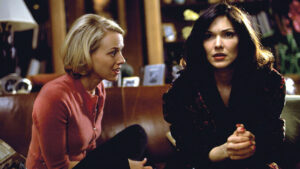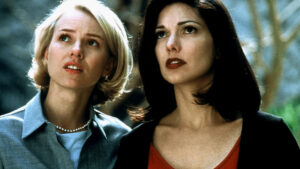Publication Date: 01-16-2025
Mulholland Drive (2001) review
Dir. David Lynch
By: Steve Pulaski
Rating: ★★★½
 Remembering David Lynch
Remembering David Lynch 
 1946 – 2025
1946 – 2025 
David Lynch’s Mulholland Drive isn’t the kind of film that can be adequately explained, but I’ll give it a whirl. The film initially follows two characters, Betty (Naomi Watts) and Rita (Laura Ellen Harring). Rita is an amnesiac, who took the name Betty gave her upon her realizing she cannot remember anything following a car accident, and believes she is Diane Selwyn, a name she recalls from a waitress’ name-tag. Betty is a perky blonde woman who spends her days in Hollywood Hills, auditioning for movie roles and acting as Rita’s caretaker, for she cannot carry on by herself. Rita, an attractive brunette, shouldn’t even be alive not only because she was almost killed in her limousine but instead made out alive upon being in a head-on collision from one of two drag-racers on Mulholland Drive.
Despite Betty’s gracious assistance and charity towards Rita, we can see a personal satisfaction in her as she finds someone dependent on her kindness and sympathy. Things begin to get especially convoluted with the sudden presence of a movie director (Justin Theroux), who is told to cast an actress in his movie or suffer the consequences, all while dealing with his wife cheating on him with the pool-boy (Billy Ray Cyrus), and our two main characters might not actually be the people we see them as throughout much of the film. Lynch, you swear, could almost be heard cackling behind the scenes at a bait-and-switch that is unexpected but self-calculated enough to turn the entire film on its head, making the audience question not only what they’ve seen, but what, if anything, can be believed at this point?

Mulholland Drive‘s surge of popularity well after its disappointing, post 9/11-release in October 2001 should be credited to sites like Salon, Reddit, and fringe Blogspots intent on piecing the film’s seemingly (and quite possibly) unrelated sequence of events together in order to come up with something marginally coherent. Fans and followers of Lynch get a kick out of working towards something bigger than most films they’re accustomed to watching, which is why a movie like Mulholland Drive can be a source of great accomplishment. Unlike Eraserhead, the film isn’t empty style put to use for an atmospheric movie with little else to offer. Lynch’s erotic, neo-noir epic actually has a terrific theme – one of many – buried in its dense web of characters and plot-threads, but the difficulty some might have extracting it undermines the entire work as a whole.
Going back to Stanley Kubrick, a director whose films I recently revisited, while frequently cryptic and ambiguous, he was wise at how to capture not only his actors but the themes and central ideas that often encased them in a project substantially larger than them. Like Lynch in the regard that he wasn’t very often character-centered nor fixated on the psychology of a certain soul in his films, Kubrick nonetheless made his films more accessible. At times I find Lynch appears to masquerade his work as something that has deeper meanings by making plotlines and instances deliberately difficult to follow. Where Kubrick was often open about his films to a certain degree, Lynch is eerily silent when it comes to dissecting them and elaborating on his process outside of purely personal matters that occurred during filming. These are all red flags of someone that, while in possession of some very unique ideas, might not totally even understand what they are or what his projects entirely represent.
While that’s fine to some people, it makes his work that much more impenetrable to audiences and Mulholland Drive unfortunately suffers from a narrative that is far more confusing than it needs to be. By making Mulholland Drive a film so difficult to define and analyze, Lynch undermines great commentary thanks to a perplexing narrative timeline and his usual desire of throwing too much at audiences in such a short amount of time.
Much of the film can be attributed to it being an intriguing meditation on women in Hollywood and their replaceable quality. Lynch shows through noteworthy moments of lust, greed, ego, and desperation, and through several different characters how women need to survive on either their God-given talent, their need to supplant their identity for a new one, or their need to make it at the expense of others or by drastic measures. Cinematographer Peter Deming and Lynch work to compliment this narrative by illustrating a bygone time during the era of New Hollywood where actresses could forge lengthy, prosperous careers based on the success of their films; one or two bombs or disappointments didn’t solidify the fate of all actresses. Crafted is a mise-en-scene greatly reminiscent of old Hollywood genre-films and noirs that are seldom made anymore.
Consider the two widely debated, yet highly regarded, lesbian sex scenes at the center of Mulholland Drive, both between Betty and Rita. For one, the scenes are both in private, one in a bed, the other on a couch, and both are elegantly complimented by uniquely canted angles that capture the sex in an overhead manner that still accentuates the private space the two women inhabit at the present moment. Ordinarily, sex – especially from the male perspective or between two women – is done for the pleasure of an audience, but here, it’s a passionate display of energy and love between two people, one leading a public life and the other thinking she’s living a private life. It’s not immune from the dreaded male gaze that might indeed be inherent as some suggest, but it’s presented in an unusual way, concealed off from bystanders and intimately, affectionately private.
Besides painting a very different environment atypical from his usual comfort zone (assisted by Eraserhead actor Jack Fisk, who serves as production designer here), Lynch and his team still find ways to incorporate their unbelievable talents for immaculate sound design. The climactic instance of this comes at the Silencio Club, a Spanish hot-spot for night-life that features an Operatic singer whose voice trembles as it belts out a lovely standard that makes the two ladies emotional and beside themselves. It removes them from their current location, as it does us, if we’re fully immersed in Lynch’s vision, sending chills up our spines while arresting the viewer with a moment unlike any Lynch has ever conceived on film. There’s a handful of runners up, but the late scene at the Silencio Club serves as my favorite.
Mulholland Drive was originally conceived as a TV series, although it’s hard to believe what kind of network at the time would’ve bought into something quite like this. A disillusioned Lynch decided to use the remnants of his passion project as the source for a layered movie, and the result makes one especially curious to see how a TV show or miniseries would’ve treated the characters in the film. I suspect better and with a bit more ease in terms of peeling back the wrapping to reveal the reversal that is far too abrupt in the film. This is one of those movies that is made and meant for you never to fully grasp. Like Eyes Wide Shut, it’s a film you can endlessly analyze and drive yourself mad by reading deep into all the possibilities of meaning and significance. Film critic Roger Ebert states the film is best “to experience it as a series of scenes, each one with a power and consistency of its own, that do not “add up” to a logical plot summary, or cannot be reduced to an explanation.” I can more or less agree. Like the twisty, windy road of Mulholland Drive, you can get lost on it, but you can also bravely traverse it. Depending on your speed or your apprehensiveness, you might come out alive, but you might also come out changed or considerably taken. Proceed with caution.
My review of The Grandmother (1970)
My review of Eraserhead
My review of The Elephant Man
My review of Dune (1984)
My review of Blue Velvet
Starring: Naomi Watts, Laura Elena Harring, Justin Theroux, Ann Miller, Robert Forster, and Billy Ray Cyrus. Directed by: David Lynch.
About Steve Pulaski
Steve Pulaski has been reviewing movies since 2009 for a barrage of different outlets. He graduated North Central College in 2018 and currently works as an on-air radio personality. He also hosts a weekly movie podcast called "Sleepless with Steve," dedicated to film and the film industry, on his YouTube channel. In addition to writing, he's a die-hard Chicago Bears fan and has two cats, appropriately named Siskel and Ebert!


